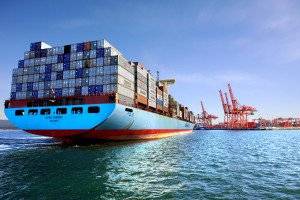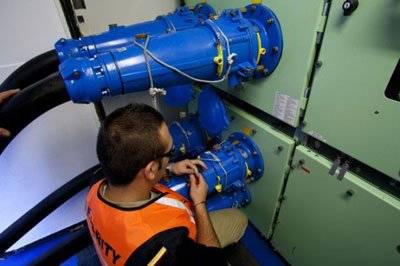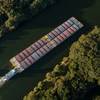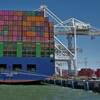Vancouver to Install Shore Power for Containerships
Government of Canada and Port Metro Vancouver announce funding for shore power for container vessels; installation of facilities at two Port Metro Vancouver container terminals will reduce emissions and noise
Funding for the installation of shore power facilities for container vessels at two Port Metro Vancouver container terminals has been announced by Kerry-Lynne D. Findlay, Canada’s Minister of National Revenue and Member of Parliament for Delta-Richmond East, on behalf of Lisa Raitt, Minister of Transport, and Port Metro Vancouver President and Chief Executive Officer Robin Silvester.
Also present for the announcement were partners BC Hydro, Global Container Terminals – operators of Deltaport terminals – and DP World Vancouver, operators of Vancouver’s Centerm.
Shore power reduces emissions by allowing vessels to draw power from the local electrical grid and thereby turn off their diesel engines while in port. Each ship connection to shore power is estimated to avoid greenhouse gas emissions of 75 metric tons.
The total project funding is $12 million ($6 million from Transport Canada’s Shore Power Technology for Ports Program and $6 million from Port Metro Vancouver): $4.97 million ($2.485 million from Transport Canada, $2.485 million from Port Metro Vancouver) will be used to install shore power technology at a berth at Global Container Terminal’s Deltaport terminal in Delta, B.C., while $7.3 million ($3.8 million from Port Metro Vancouver, $3.5 million from Transport Canada) will be used for the installation of shore power technology at a berth at DP World Vancouver’s Centerm Container terminal in Vancouver., and necessary upgrades on nearby BC Hydro property.
Both shore power operations are expected to be operational by March 31, 2017.
“We are proud to be investing in shore power at Port Metro Vancouver’s Centerm and Deltaport container terminals,” Findlay said. “Federal initiatives such as the Shore Power Technology for Ports Program will not only help the environment and improve our health, but will also position British Columbia’s trade sectors to take advantage of growth opportunities, increase revenues and create jobs.”
Silvester said, “Port Metro Vancouver is mandated to facilitate Canada’s trade while protecting the environment and supporting communities. The installation of shore power at container terminals in Vancouver and Delta represents another positive step in ongoing work to reduce marine shipping emissions, work that has resulted in significant improvements in Metro Vancouver air quality. We are very proud of the collaboration between the Government of Canada, Port Metro Vancouver, BC Hydro, DP World and Global Container Terminals to bring shore power facilities for container ships to our port.”
Port Metro Vancouver was the first port in Canada to implement shore power for cruise ships, and since 2009, more than 11,000 metric tons of greenhouse gas emissions have been avoided.
The use of shore power at Port Metro Vancouver container terminals will further reduce greenhouse gas emissions, contribute to Canada’s emissions reduction targets, and assist Port Metro Vancouver in reaching targets under the Northwest Ports Clean Air Strategy, a collaboration between Port Metro Vancouver and the ports of Tacoma and Seattle, to reduce emissions in the shared Puget Sound – Georgia Basin airshed. Shore power will also ease the impacts of growing Canadian trade on communities by reducing generator noise associated with the auxiliary engines of container vessels while in port.
“Shore power works in B.C. because of our clean hydroelectricity. More than 95 percent of the electricity BC Hydro generates is clean and that gives industry and businesses in B.C. a huge advantage,” said Keith Anderson, Vice-President, Customer Service at BC Hydro. “By working with Port Metro Vancouver and other stakeholders we’ve developed a shore power electricity rate that will help promote the use of shore power beyond cruise ships at Canada Place to other ports like the container terminals in Delta and Vancouver.”

















